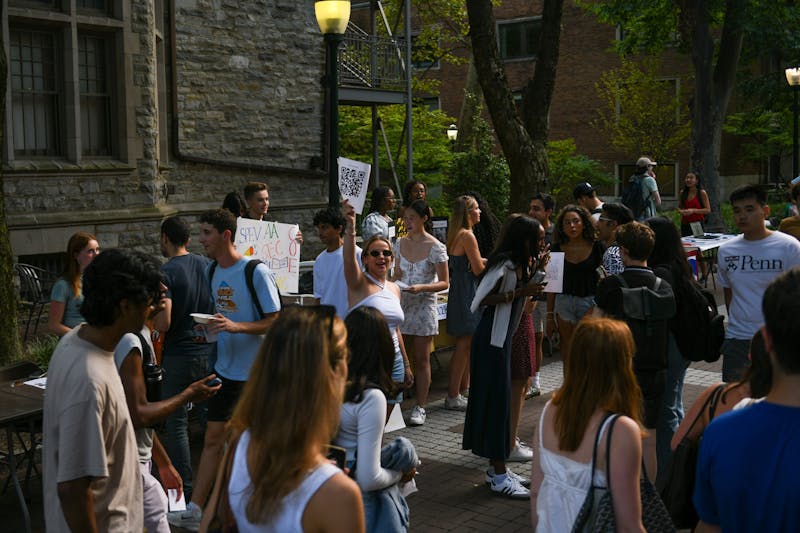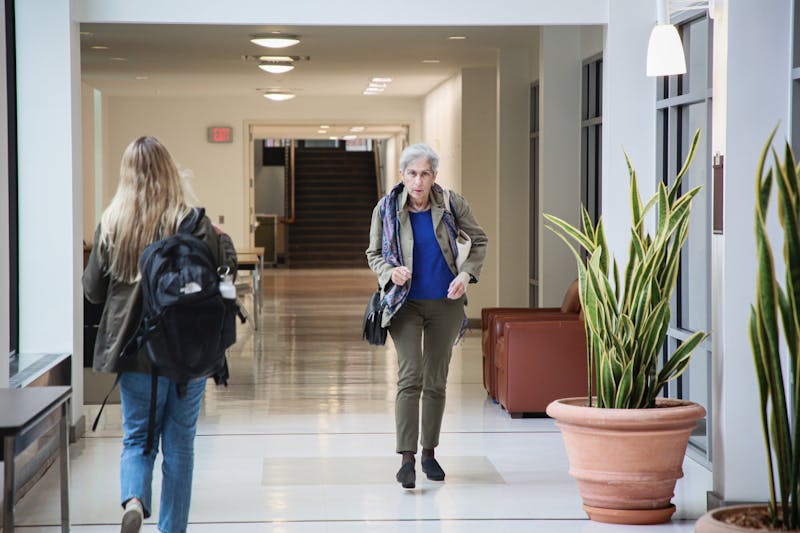I really don't have a problem with our University's president acting like a cheerleader when it comes to fundraising. If it makes people give Penn lots of money, then it's fine by me.
But required superhero traits aside, it's time for Amy Gutmann to put the pom-poms down for a little bit and work on the other half of her job description. Specifically, the part about being the de facto second mayor of Philadelphia.
As the head of the city's largest private employer, she's got some metaphorical weight to throw around -- something she's done mainly on campus so far.
While she responded relatively quickly to the suspension of the AlliedBarton guards, in the past year and a half there have been many missed opportunities for Gutmann to have a greater impact outside the campus boundaries. Throughout the recent SEPTA strike her office was noticeably silent, issuing only contingency plans.
Of course, her primary focus should be to improve Penn through campus-based initiatives. However, our University is inextricably tied to Philadelphia. The city's failures and successes are Penn's, and vice versa.
Unfortunately, that means both Penn and Philadelphia share a big problem. Well, make that several big problems.
One is brain drain, the flight of college students from the city after graduation, which is depriving our city of many young and qualified potential employees. Another is our less-than-stellar rank as a college town. For years, Philadelphia has marketed itself as the college capital of America -- only to have a recent study prove that claim false.
Luckily, these are problems that Gutmann can help to alleviate by flexing her "mayoral" muscle. Perhaps the best opportunity for her to do so is through Campus Philly and its Greater Philadelphia Students Association's Ambassadors Program.
The program places students on various boards or committees throughout the city. When I met with Jon Herrmann, the executive director of Campus Philly and a 2000 Wharton graduate, he gave me a prime example of why such student participation is important.
Not long ago, he was the youngest person sitting on a board that was discussing the rule concerning Philadelphia's 2 a.m. closing time for the serving of alcohol.
Most of the old "fuddy-duddies" -- my word choice, not his -- on the board immediately dismissed the idea of extending the time allotted for drinking, stating that there was no reason to do so. The idea that, say, young people in particular, might want to drink past 2 just didn't occur to them. Until Herrmann pointed it out, no one realized how much their businesses could profit from such a change.
This is the kind of oversight that the Ambassadors Program hopes to put an end to -- and not only in areas concerning the entertainment and service industries. Government departments, other professional associations and non-profit organizations all need to be aware of the undergraduate and recent graduate point of view.
For efforts to revitalize the city to be successful, the young people of Philadelphia need to be engaged in the process.
Similarly, for the Ambassadors Program to reach its full potential, Gutmann needs to get involved.
By virtue of being Penn's president, she knows people. Plus, she already serves on both the Executive Committee and the CEO Council of the Greater Philadelphia Chamber of Commerce.
It's common that people who serve on one board also tend to serve on others. As a result, her contacts extend well beyond the Chamber of Commerce.
Gutmann can sell the Ambassadors Program to others -- perhaps during meetings or fundraising events. In her last year as Penn's president, Judith Rodin served on lots of boards. This suggests that Gutmann's presence in boardrooms will only increase with her tenure. The Ambassadors Program's presence should grow with it.
I'm not suggesting that Penn's administration get involved in any sort of official capacity. That would risk overshadowing the Greater Philadelphia Student Association and ruining the whole thing.
Nonetheless it is a relatively small organization that could use some help. By unofficially lobbying for the Ambassadors Program, Gutmann could greatly increase its impact.
Imagine a Philadelphia better attuned to students' needs, one that can attract and retain young people in large numbers. It would certainly be something worth cheering about.
Amara Rockar is a junior political science major from St. Louis. Out of Range appears on Tuesdays.
The Daily Pennsylvanian is an independent, student-run newspaper. Please consider making a donation to support the coverage that shapes the University. Your generosity ensures a future of strong journalism at Penn.
DonatePlease note All comments are eligible for publication in The Daily Pennsylvanian.







